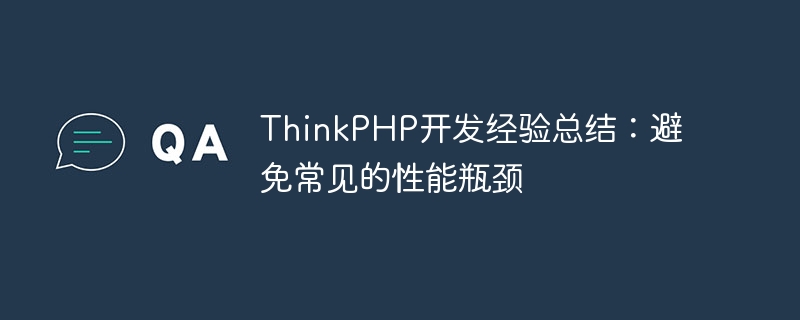
ThinkPHP is a very popular PHP development framework that is widely used in the development of various web applications. When developing with ThinkPHP, we often encounter some performance bottlenecks, which may affect the performance and user experience of the application. This article will summarize some experiences in avoiding common performance bottlenecks, hoping to be helpful to other developers.
- Reasonable use of caching mechanism
Caching is one of the common methods to improve application performance. ThinkPHP provides rich caching mechanisms, such as file caching, database caching, Redis caching, etc. When using cache, you need to choose the appropriate cache method and cache expiration time based on the actual application scenario to avoid performance problems caused by cache expiration or improper cache use.
- Database optimization
The database is one of the core components of the application. Optimizing the database can effectively improve the performance of the application. When using ThinkPHP for database operations, it is recommended to use appropriate indexes to speed up query operations and avoid invalid queries and unnecessary data loading. At the same time, a caching mechanism is used to cache frequently queried data to reduce the number of database accesses.
- Avoid redundant file operations
File operations are common IO operations in development, but frequent file operations will affect the performance of the application. When using ThinkPHP for file operations, redundant file operations should be avoided, such as reading and writing the same file multiple times. If you need to operate files frequently, you can consider using caching technology to cache file contents in memory to reduce the number of file IOs.
- Reasonable use of cached templates
ThinkPHP's cached template function can cache the rendered template content, and use the cached template content directly on the next request to avoid repeated rendering. This can effectively reduce the load on the server and improve application performance. However, it should be noted that the cache validity period should be set appropriately to avoid expired cache causing users to see outdated content.
- Reduce HTTP requests
In web development, communication between the browser and the server is completed through HTTP requests. Each HTTP request consumes server resources and reduces application performance. Therefore, reducing HTTP requests can effectively improve application performance. When developing with ThinkPHP, you can reduce the number of HTTP requests by merging CSS and JavaScript files and using CSS Sprites technology.
- Use CDN to accelerate static resources
Static resources such as images, CSS and JavaScript files may be loaded repeatedly in multiple pages. Using CDN (content distribution network), static resources can be cached on servers closer to users, improving the loading speed of static resources. When using ThinkPHP for development, you can configure CDN to accelerate static resources, reduce the load on the server, and improve application performance.
- Reasonable use of HTTP caching
HTTP caching means that the browser saves a web page resource when it first requests it, and directly uses the cached resource on the next request to avoid making another request to the server. When developing using ThinkPHP, you can use the caching mechanism provided by the framework to set appropriate HTTP caching strategies to improve application performance.
Summary:
By rationally using the caching mechanism, optimizing database operations, reducing file operations, rationally using cache templates, reducing HTTP requests, utilizing CDN and HTTP caching, we can avoid common problems Performance bottlenecks to improve application performance and user experience. During the development process, we should choose an appropriate optimization strategy based on the actual situation, and conduct continuous testing and tuning to ensure the high performance and stability of the application.
The above is the detailed content of ThinkPHP development experience summary: avoid common performance bottlenecks. For more information, please follow other related articles on the PHP Chinese website!

